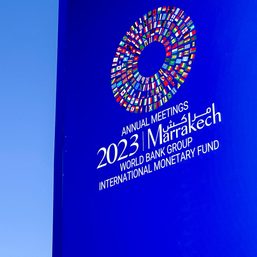SUMMARY
This is AI generated summarization, which may have errors. For context, always refer to the full article.

Developing countries are suffering a drop in a key source of revenue as the coronavirus pandemic causes worldwide shutdowns, reducing payments from workers living abroad, the World Bank said on Thursday, October 29.
A new report estimates remittances to low- and middle-income countries are expected to fall this year by 7% to $508 billion.
They are expected to decline another 7.5% in 2021 as employment and migration is slowed by the pandemic restrictions and economic slowdown, curtailing the funds workers can send home to their families.
Although the result is slightly better than April when flows in 2020 alone were projected to plunge by 20%, the 14% drop over two years is still a big hit to a revenue source that the World Bank said outstripped foreign direct investment in 2019, when it hit a record $554 billion.
Immigrants are especially vulnerable to loss of wages since they tend to be concentrated in urban areas and work in service industries hardest hit by the economic shutdown, including food and hospitality, retail and wholesale, tourism and transport, and manufacturing.
“The impact of COVID-19 is pervasive when viewed through a migration lens as it affects migrants and their families who rely on remittances,” said Mamta Murthi, the World Bank’s vice president for human development.
He stressed the need for “countries to keep the remittance lifeline flowing.”
The report noted that remittance flows recovered somewhat in June, rebounding from the sharp declines in April and May.
However, it appears “some migrants drew on their savings to send money home, but that cannot be sustained for long.”
Some migrants also benefited from government aid programs, but undocumented workers would not have access to those payments.
All regions are expected to see declines in remittance payments, the report said,
The steepest drop is expected in Europe and Central Asia (by 16% and 8%, respectively), followed by East Asia and the Pacific (11% and 4%), the report said.
Sub-Saharan Africa will see declines of 9% and 6%, while Latin America and the Caribbean fares better with a dip of 0.2% this year and an 8% drop in 2021.
In some countries, payments from workers abroad amount to a quarter or even one-third of gross domestic product, including Tonga, Haiti, and Lebanon. – Rappler.com
Add a comment
How does this make you feel?


![[Time Trowel] Evolution and the sneakiness of COVID](https://www.rappler.com/tachyon/2024/02/tl-evolution-covid.jpg?resize=257%2C257&crop=455px%2C0px%2C1080px%2C1080px)







There are no comments yet. Add your comment to start the conversation.